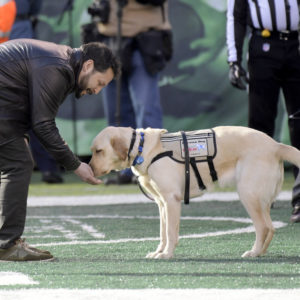Call her the new “Octomom.” A service dog named Ellie gave birth to a litter of eight puppies at the Tampa airport recently while her handler was awaiting a flight. While the occasion was a welcome reprieve from the depressing news cycle, it was also a reminder that clearer standards for service dogs are needed. A heavily pregnant dog probably isn’t best suited to provide the service on which her handler depends.
Rigorous service dog credentialing can help fill this void. In an effort to achieve that, American Humane helped create Operation Service Dog Access, the first third-party and hands-on assessment program for service dogs and their handlers.
The national epidemic of post-traumatic stress (PTS) and traumatic brain injury (TBI) among Afghanistan and Iraq war veterans has made higher service dog credentials a pressing concern. About 400,000 veterans of these wars have PTS. Around 20 veterans commit suicide each day.
Emerging empirical evidence suggests service dogs are a helpful treatment for veterans with PTS. Research shows that service dogs can address the social, biological and psychological symptoms of this often debilitating condition.
For instance, a Purdue University study released this spring compared veterans coping with PTS who had a service dog with those who didn’t. Results showed that veterans with a service dog scored higher on a variety of mental health and emotional well-being metrics, including lessened symptoms of PTS and depression. A 2009 survey distributed by the U.S. military found that four in five vets with PTS reported their symptoms diminished after being paired with a service dog.
“Before I had Atticus, I was a borderline basket case. I used to have three to five anxiety attacks a week,” said Corey Houghtaling, from Ogdensburg, N.J., echoing the service dog experience of countless war veterans suffering from PTS. “Now, with the dog, I have maybe one. When I do have one, the dog senses it, and starts licking my hand and kissing me.” As a result of these benefits, thousands of service dogs are matched with veterans suffering from PTS each year.
Yet the lack of independent service dog standards and assessments puts veterans at risk of receiving a dog that is “service” in name only and not properly trained to meet their needs. This also puts these veterans at risk of discrimination from businesses that equate service dogs solely with physical disabilities. A 2016 survey of retail employees conducted by American Humane found nearly one-quarter of respondents said they’re “not informed at all” about what constitutes a service dog; one-third suspected one or more customers over the past year had misrepresented their pet as a service dog.
As a result of this ignorance, veterans suffering from invisible wounds of war are sometimes denied access to businesses because of their service dogs. For example, Kevin Johnson, an Iraq War veteran from Belleview, Ill., was denied access to a bar because he was accompanied by his PTS service dog Daisy. Even Houghtaling was denied a regular table at a local restaurant because he was with Atticus.
To help protect veterans and inform business owners, American Humane partnered with the National Association of Veteran-Serving Organizations and other experts to create an independent and rigorous credentialing program for service dogs. Veterans interested in acquiring the Operation Service Dog Access credential begin the application and assessment process online before completing a public performance evaluation of the veteran and service dog pair, which is monitored by unbiased experts.
This credential and the publicly accessible Operation Service Dog Access database of each service dog verified under the program gives business owners peace of mind that they are allowing a legitimate service dog in their place of business. This will help them avoid potential liability concerns related to service dog admittance under the Americans with Disabilities Act.
Of course, legal concerns should be secondary to easing the lives of veterans with PTS. Even if that means fewer “on-duty” service dog puppy deliveries in the years to come.

